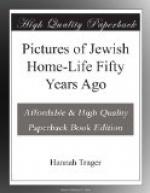[Illustration: The old lady]
“After we leave her we take a walk outside the suburb. At sunset, when we return home, until the time to go to bed, we are kept very busy washing up all the things used at meals, as no washing up is done during the Sabbath. Then, too, all the Sabbath curtains, coverlets, glass, china, and silver have to be carefully put away.
“In my next letter I will write you more about our old lady.”
When Mr Jacobs had finished the letter, the usual talk started. One said that “Such a Sabbath might be all very well in Palestine!”
An elderly friend said: “Well! in Palestine they at least know what the Sabbath is, whilst here in London, unless one keeps it strictly and remains indoors all day, except to go to synagogue, one never sees any difference between the Sabbath and any other day of the week.”
Mr Jacobs said: “I think what you both say is true, and the only way is to try to keep our Sabbath in the spirit, as well as in the letter as much as possible. If each of us tried to do this in his own home, even in London, gradually a difference would be seen in the neighbourhood in which we live. A wise man wrote: ’All reforms begin with man and not with men.’ The first important step is to think good thoughts; for ‘thoughts have wings,’ and, when expressed, they are readily impressed upon the minds of those in sympathy with the thinker.”
“True, very true!” exclaimed the others. “Let us each, with God’s help, strive to remember more often those thoughts of our Prophet Isaiah (chap. 58): ’If thou call the Sabbath a delight, and the holy of the Lord honourable, and shalt honour it, not doing thy wonted ways, nor pursuing thy business, nor speaking thereof, then shalt thou delight thyself in the Lord, and I will make thee to ride upon the high places of the earth, and I will feed thee with the heritage of Jacob thy father: for the mouth of the Lord hath spoken it.’”
By this the Prophet meant that we were to drive all thoughts of business from our minds on the Sabbath. No thoughts of scandal, evil, or uncharitableness were to be harboured, but our minds and hearts were to delight in words of prayer, in the study of the Holy Law. It was to be truly a day of peace, a day of rest.
THE SUCCAH
Mr Jacob told his friends the next Friday evening, when they arrived as usual, that he thought they would be interested in the letter describing the Succah.
“My dear Millie,—After the Day of Atonement, everyone was very busy preparing for the Feast of Tabernacles, which is still celebrated here as it must have been in Bible times.
“With great merriment all the young people decorate their Succahs, while their mothers with the baby in their arms watch the young folks at work.
“The Succahs in Palestine are not made as they are in Europe. The saplings are covered with palm-leaves woven together, the roof with branches of trees, as there is no chance of rain at this time of the year in Palestine. Everything that is beautiful in the home is brought out to decorate the interior of the Succah. The poor make their Succahs of doors or wooden boxes.




